Lady Lists Reasons She Doesn't Want Her Fiancée to Get a Pet, Loses Her Cool, and Gets Termed a Controlling AH
Having a cat can lead to a very fulfilling relationship. A cat may instantly provide an outlet for play and enjoyment while also calming your nervous system.
Cats are independent creatures that like to forage and explore on their own schedules, but they are also incredibly loving toward their owners and other individuals they can rely on. But what happens when your partner doesn't want to have a pet?
The OP and her fiancée will be moving in together soon, and since she has a house and her partner is renting, it made sense for her to move to the OP's place. The partner's current apartment doesn't allow any pets, and since she grew up with many pets, she has been missing having one.
I do sympathize with her desire for another pet in her life, so I've been trying to be very gentle in reminding her that I do not want a pet in our house. I have explained to her the reasons for this many times, and she agrees that it would be better not to have a pet.
The OP listed her reasons for not wanting to get a pet, but her partner was still adamant about getting one. The OP admits that she lost her patience and came across as much harsher than she intended when she told her that she could not have a cat, which led to her partner blowing up and calling the OP a controlling AH.
The Headline

The Story Kicks Off
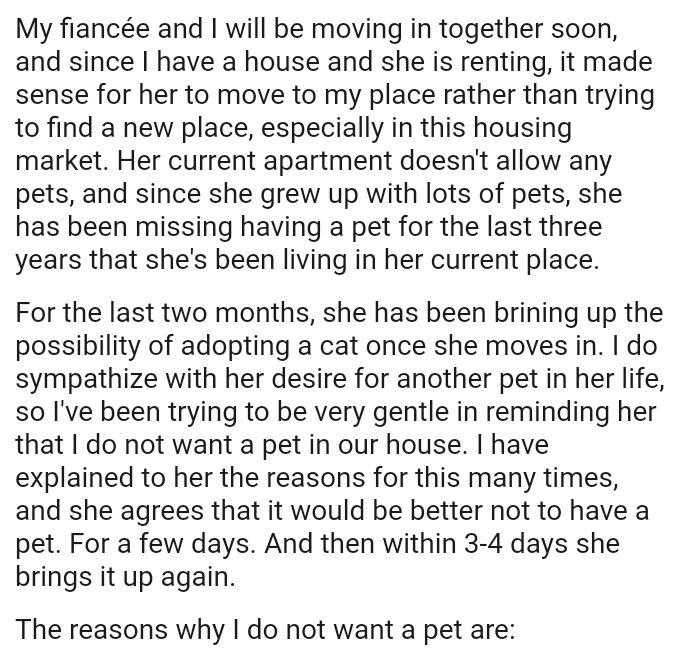
Here Are the Reasons

Understanding Relationship Dynamics
This situation highlights the complexities of navigating relationship preferences within a partnership. Research in couples therapy emphasizes the importance of mutual respect and understanding in relationships.
When one partner expresses strong feelings about a potential pet, it can indicate deeper concerns about responsibilities and boundaries.
The Psychology of Pet Ownership
Dr. Alice Monroe, a behavioral psychologist at the University of Chicago, explains that pet ownership often reflects deeper emotional needs.
For many, having a pet can provide companionship, reduce stress, and improve overall well-being.
However, differing views on pet ownership can strain relationships, particularly when one partner feels strongly against it.
The Concluding Part
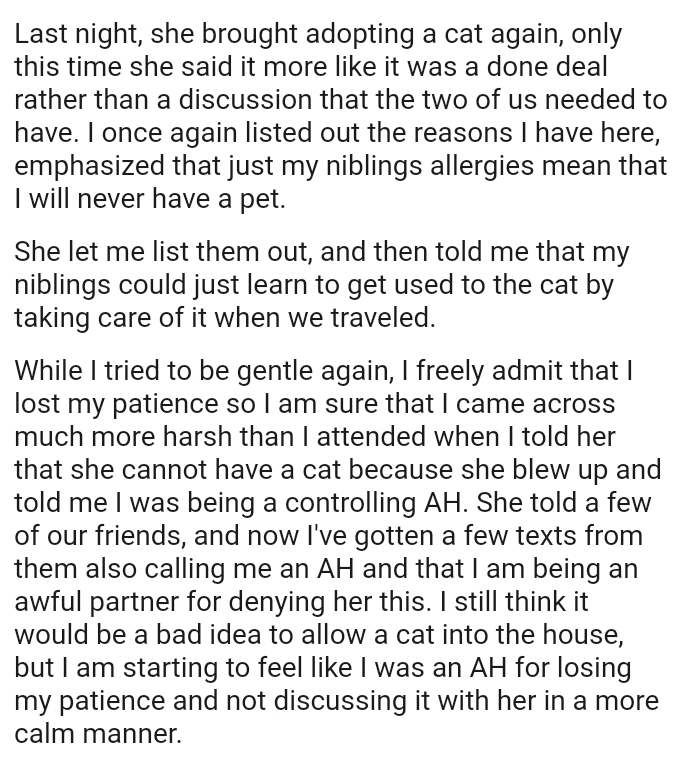
OP Has Offered the Following Explanation for Why They Think They Might Be the A-Hole:
I feel like I may be the AH because I lost my patience with my partner and told her that she cannot get a cat, despite wanting one so badly. I was perhaps more harsh with her than necessary and may have even come across as controlling.
The Comments Roll In...
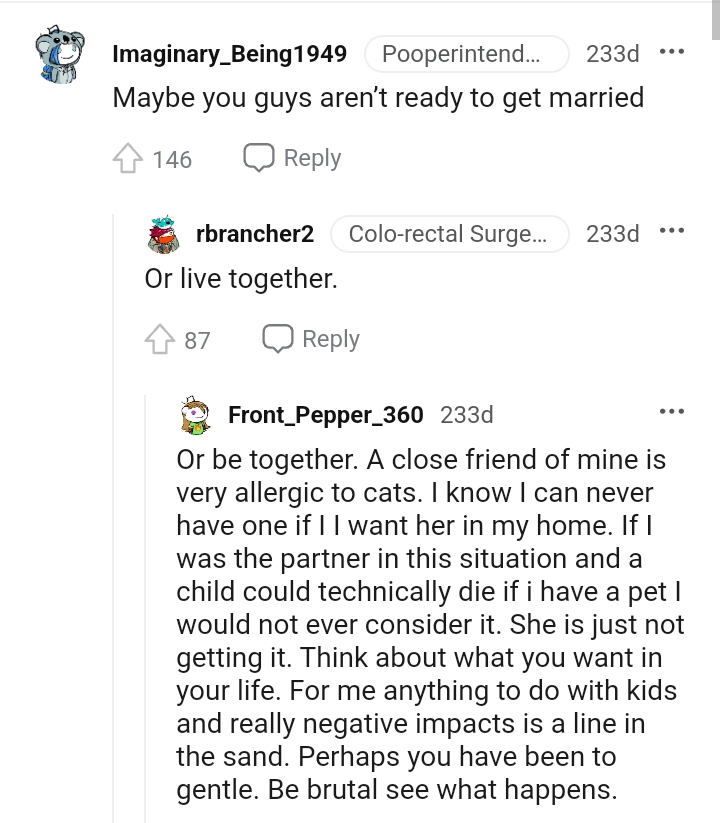
It's Not Something to Play Around With
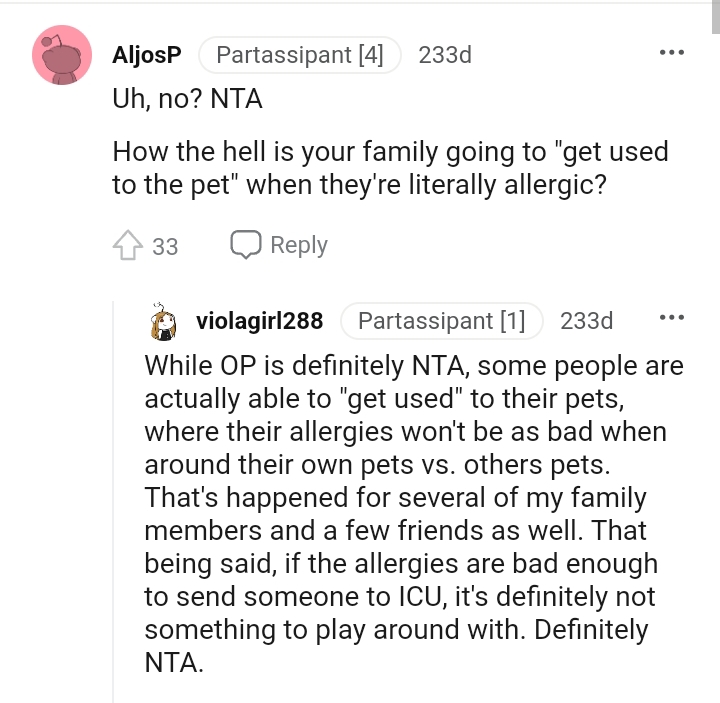
A licensed therapist notes that fears surrounding pet ownership often stem from concerns about additional responsibilities and lifestyle changes.
Studies show that discussions surrounding significant relationship decisions should prioritize open communication and understanding, especially when both partners have differing views.
Research published in the Journal of Animal Behavior indicates that pets can significantly enhance emotional health, but they also require commitment and responsibility.
When one partner is hesitant about welcoming a pet into the home, it can lead to feelings of resentment and conflict.
Understanding these dynamics is crucial for couples navigating this decision.
That's Not Dangerous
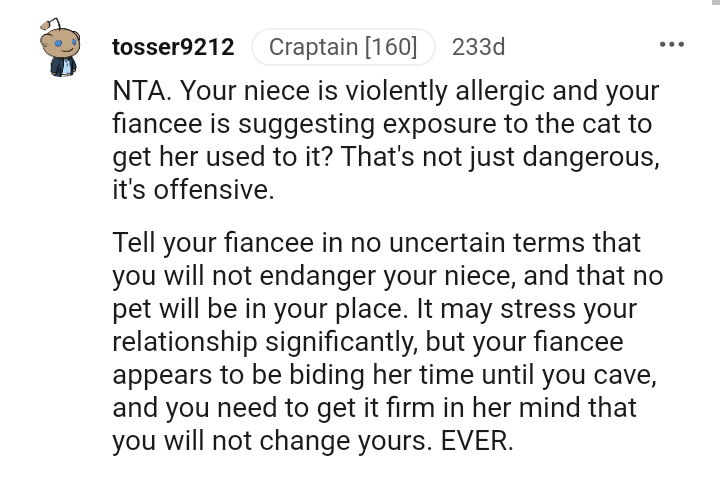
You'll Eventually Give In
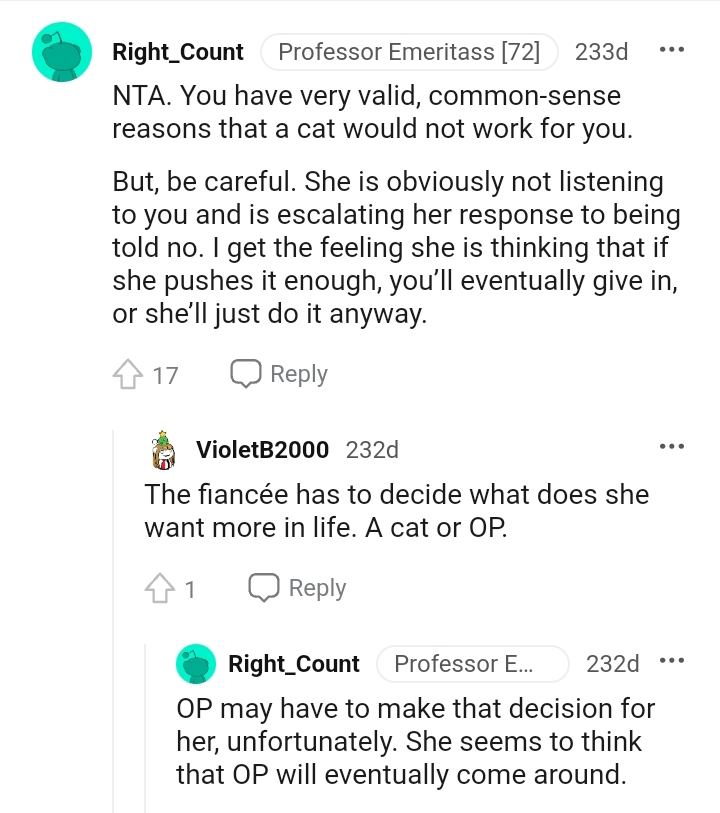
The OP Gives More Details in the Comments
To be more specific, my tone came across as very frustrated, and I raised my voice a little but not at all to the point of shouting. I don't think I quite understand the power imbalance issue; sorry. If it's about the house, I am signing her onto the mortgage so she would be able to be half-owner, so it really won't be like the house is just mine.
Do you think that is still adding to a feeling of being controlled? I am genuinely asking because I really don't want her to feel like I am controlling her or that I have some power over her, even if my post didn't communicate that very well.
The OP's Not Wrong
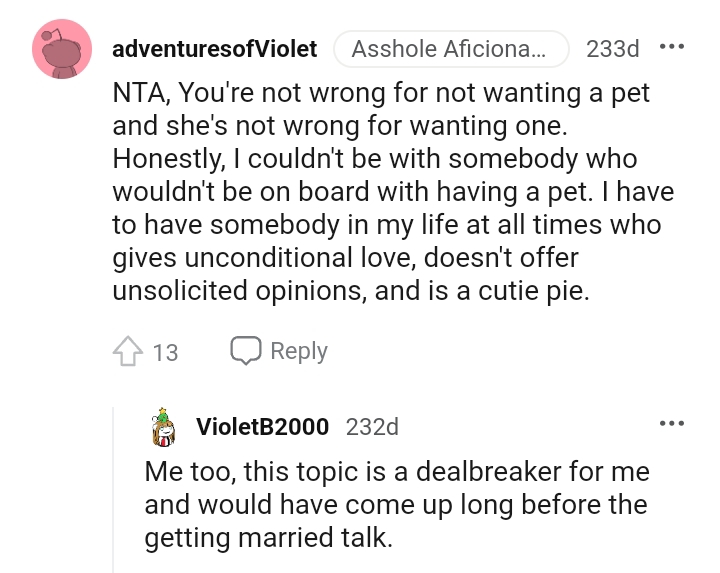
The Importance of Communication in Relationships
Effective communication is crucial in resolving conflicts about shared decisions. Research indicates that using 'I' statements can help individuals express their feelings without placing blame.
Encouraging partners to share their perspectives can promote a more constructive discussion, allowing for mutual understanding and respect.
The Role of Compromise in Relationships
Compromise is essential in navigating differences in relationship dynamics. Dr. Robert King, a relationship expert at the University of Pennsylvania, emphasizes that finding common ground can strengthen partnerships.
By discussing each partner's feelings and expectations regarding pet ownership, couples can work towards a mutually agreeable solution.
This collaborative approach can enhance relationship satisfaction and reduce conflict.
The Reluctance Is Alarming
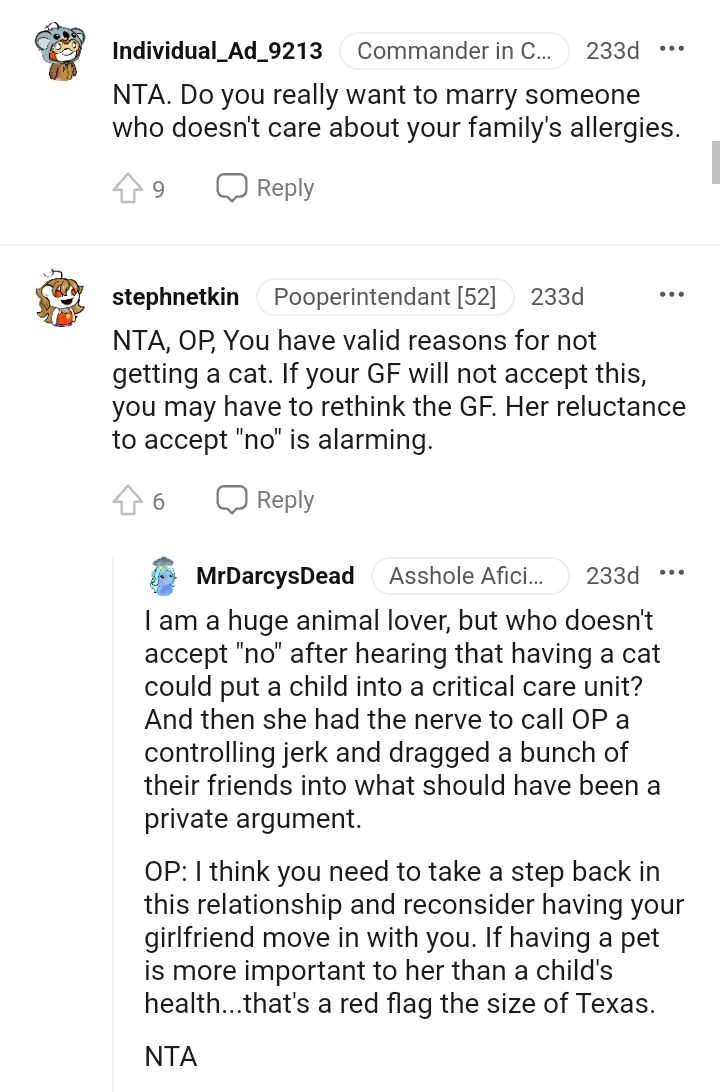
This Is Life-Threatening
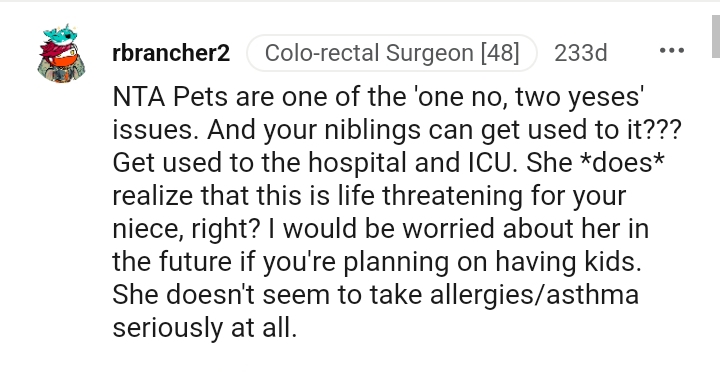
The OP Gave Specifics
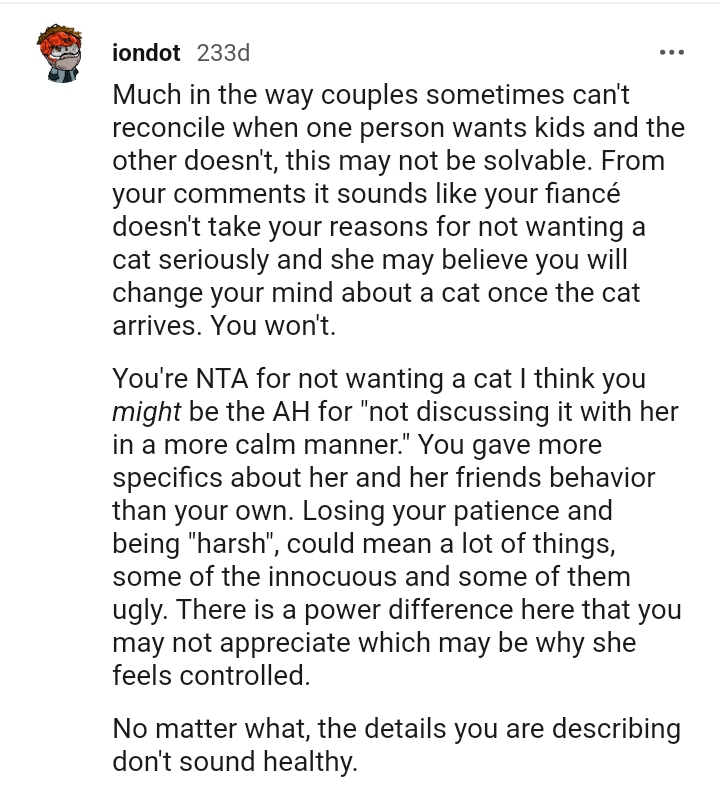
Additionally, exploring each partner's underlying concerns can provide insight into the emotional dynamics at play. This deeper understanding can lead to more effective problem-solving and compromise.
Psychologists recommend regular check-ins to discuss feelings and expectations, fostering a healthy dialogue.
When discussing pet ownership, it's crucial to frame the conversation around shared values. Research suggests that highlighting the benefits of pet ownership, such as companionship and emotional support, can help address concerns.
Using positive language can create a more constructive dialogue and reduce defensiveness.
This approach fosters a sense of partnership in the decision-making process.
What makes the OP sad is that her fiancée is so understanding of their other allergies—no peanuts, tree nuts, or eggs for either, and no dairy or soy for the nephew! But regarding the allergies, she just doesn't seem to get on the same level.
Redditors dissected the whole story, and the OP was declared not the AH, and you can drop your own opinions in the comments section below.
Exploring Underlying Motivations
Understanding the underlying motivations for wanting or not wanting a pet can provide valuable insights. Dr. Susan Clark, a psychologist at Harvard Medical School, notes that emotions often drive these preferences.
When partners can openly discuss their feelings about pets, it can lead to greater understanding and empathy, reducing tension.
Such discussions can help clarify each partner’s emotional needs and expectations.
Building a foundation of trust is key in navigating these conversations. Research indicates that trust facilitates open communication and allows partners to express their feelings without fear of judgment.
When trust is established, couples are more likely to engage in constructive discussions about pet ownership and reach resolutions that satisfy both partners.
This trust can enhance relationship dynamics and promote cooperation.
Psychological Analysis
This situation illustrates the importance of communication in addressing differences in relationship dynamics. By understanding each other's motivations and concerns, couples can navigate the complexities of pet ownership more effectively.
Analysis generated by AI
Analysis & Alternative Approaches
Navigating differences in pet ownership requires open communication and a willingness to compromise. Understanding each partner's motivations can enhance empathy and reduce conflict.
Ultimately, fostering trust and collaboration can lead to healthier relationship dynamics.
Navigating Power Dynamics in Relationships
This situation may reflect underlying power dynamics within the relationship. Research shows that individuals may feel threatened by their partner's desires, leading to defensive reactions.
Understanding these dynamics is crucial for fostering a balanced partnership where both individuals feel heard and respected.
Establishing clear boundaries and understanding each partner's needs can contribute to a healthier relationship. Couples are encouraged to engage in discussions about their individual values and preferences, leading to greater harmony.
This approach can help prevent misunderstandings and promote a sense of partnership.
The Role of Trust in Relationships
Trust is foundational in navigating relationship decisions. Research indicates that partners who trust one another are more likely to engage in open communication and make joint decisions.
Building trust requires transparency and consistency, which can enhance the overall health of the relationship.
Couples are encouraged to engage in regular conversations about their expectations and concerns. By fostering an environment of trust, individuals can navigate challenges more effectively and strengthen their bond.
Psychological Analysis
This situation exemplifies the complexities of navigating shared decisions within a relationship. It’s essential for partners to approach these conversations with empathy and understanding to foster mutual respect and collaboration.
Analysis generated by AI
Analysis & Alternative Approaches
Ultimately, fostering open communication and mutual respect is essential for resolving conflicts in relationships.
By addressing underlying concerns and navigating power dynamics, couples can create a healthier, more balanced partnership.



